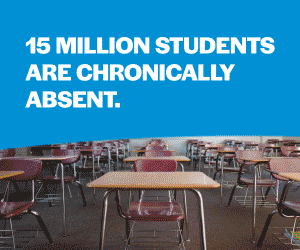 Commissioner of Education Karla Eslinger speaks during a State Board of Education meeting. (Annelise Hanshaw/Missouri Independent)
Commissioner of Education Karla Eslinger speaks during a State Board of Education meeting. (Annelise Hanshaw/Missouri Independent)
The latest round of student test scores show fewer Missouri public school districts and charter schools in jeopardy of losing accreditation, though this year’s data won’t immediately affect how schools are graded.
Based on annual performance report scores released Monday for the sixth iteration of the Missouri School Improvement Program, or MSIP6, there were 343 districts and charters that improved when compared to an average of their scores over the previous two years.
A total of 71 districts and charters scored in the provisionally accredited range, and four charter schools scored below 50%, which is the unaccredited range.
“It’s something that we’ve been waiting for. Ever since the pandemic, we have looked at scores (and seen declines),” Commissioner of Education Karla Eslinger told reporters in a press conference. “Finally… we’re starting to see the fruits of our labor. We’re starting to see where we are making progress.”
MSIP6, which launched in 2022, has been lauded as “more rigorous” and descriptive than prior versions of the program. Previously, many districts scored above 90%, whereas now their scores are more evenly distributed along a bell curve.
The score is a snapshot of student performance in end-of-course exams and statewide standardized tests along with an assessment of district continuous improvement plans.
The Missouri Department of Elementary and Secondary Education originally planned to base classification decisions on scores this year but will instead make decisions from three-year composite scores. Districts’ accreditation cannot be lowered from MSIP6 scores until 2026.
Based on composite scores for the three years of MSIP6 data, two charter schools are in the unaccredited range. The State Board of Education will determine accreditation status based on other factors, like superintendent qualifications and financial health.
Lisa Sireno, assistant commissioner of the Office of Quality Schools, told reporters the department switched to composite scores for classification this spring.
“They’re more stable measures as they contain more data,” she said. “They are less susceptible to extreme changes from year to year.”
For smaller districts, a composite can protect them from volatility while the individual score gives a look at the last school year’s work.
Craig Carson, assistant superintendent of learning of the Ozark School District, said it is “autopsy data.”
“This is data that tells you about where you’ve been,” he told The Independent. “The data we really use are the day-to-day data inside our classrooms.”
Ozark is part of the Success Ready Students Network, which is a group of school districts compiling alternative methods of accountability. This year, the districts are showing the first draft of their plan, in the form of informational dashboards available on their websites.
“We are using a descriptive (report) that is found on our website, and it gives so much more information to our public about how our students are doing in the day to day, and it really emphasizes growth,” Carson said.
He believes that the next iteration of the Missouri School Improvement Program will spring from work the Success Ready Students Network is doing.
“We are now building the momentum we need to really involve real-world learning with competency-based education and make sure that every student leaves being success-ready,” he said. “The excitement around that and the synergy of those school districts are creating, that will eventually turn into what MSIP7 will be.”
Similar to Carson, Maplewood Richmond Heights School District Superintendent Bonita Jamison reiterated that the scores are a limited look at a district.
“That data only tells one story, and there are stories that are not seen and reflected in those numbers, where the impact on the lives of children and their families are profound,” she said.
Benchmark assessments serve the district better to see needs and fill them quickly, she said.
Maplewood Richmond Heights is one of the top-scoring districts this year, amassing 97% of points possible. Just three others fared better.
She points to “shared accountability and ownership” from the entirety of the district’s staff — including a custodian who doubles as an attendance monitor to encourage parents to get children to school.
She has theories why other schools didn’t score as well, mainly a teacher recruitment and retention crisis hitting poorer, urban schools hard.
Eslinger, in last week’s press conference, told reporters that teacher vacancies “make performance and improvement challenging.”
“We know that with fewer educators, more and more courses across the state are being taught by student teachers and by folks that are substitutes that maybe have not really been trained on the specific content area,” she said. “We’ve got work to do there.”
In 2024, 37% of Missouri educators in their first year of teaching were inappropriately certified for the course they were teaching and over 10% over courses were taught by someone inappropriately certified.
Missouri Independent is part of States Newsroom, a nonprofit news network supported by grants and a coalition of donors as a 501c(3) public charity. Missouri Independent maintains editorial independence. Contact Editor Jason Hancock for questions: [email protected]. Follow Missouri Independent on Facebook and X.


























